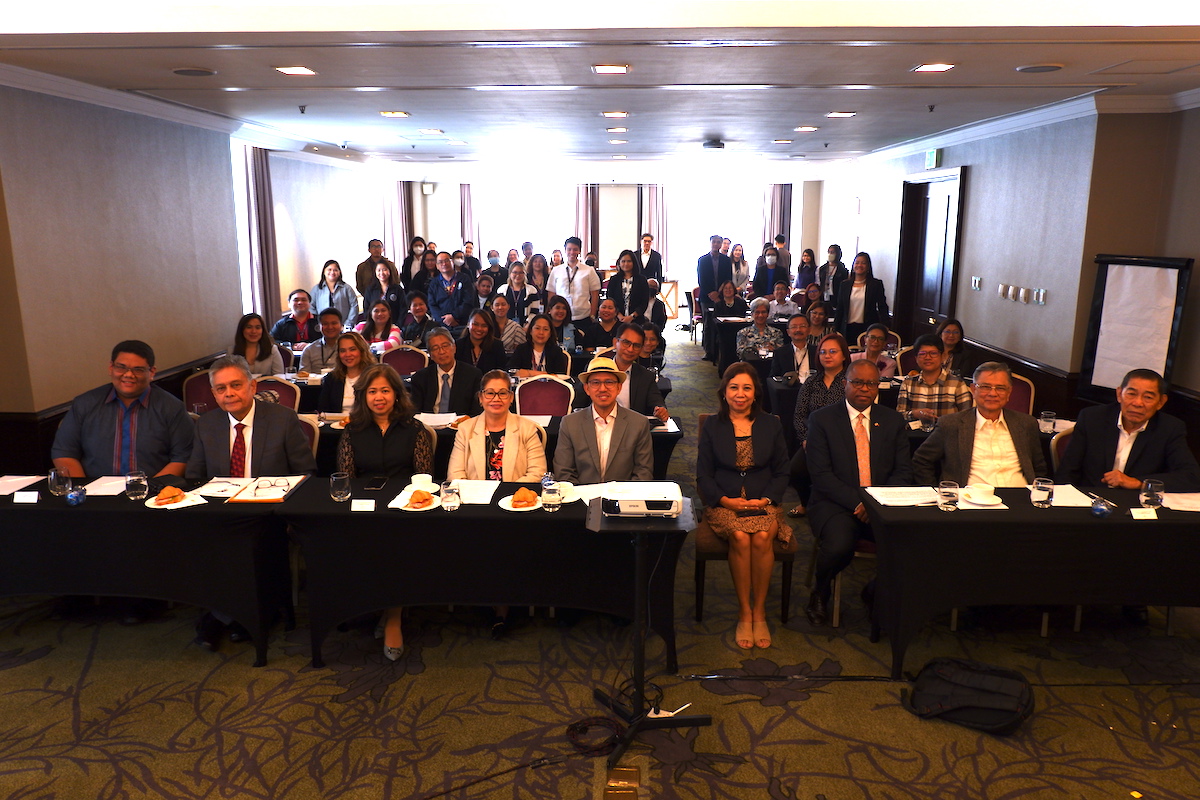
Philippine Judiciary Members Increase Knowledge and Capacity Through Biotech Webinar
July 19, 2023| |
The key role of judges and lawyers in examining how the country's legal framework can extend the level of support to the development of biotechnology was highlighted during the second leg of the 2023 Biotech Outreach Program in the Philippines. Increasing the Philippine judiciary's awareness and knowledge of biotechnology can aid in boosting the country's agricultural productivity, increase food security, promote agricultural entrepreneurship, and uplift the lives of Filipinos.
The Southeast Asian Regional Center for Graduate Study and Research in Agriculture (SEARCA), in collaboration with ISAAA Inc. and the United States Department of Agriculture-Foreign Agricultural Service (USDA-FAS) Manila, conducted the hybrid seminar titled Improving the Policy Environment for Biotech Industry Development on July 14, 2023, at Diamond Hotel, Manila, Philippines and was also livestreamed on Zoom. There were 115 members of the judiciary who participated in the event, 80 of which were present onsite and 35 joined online. The Philippine Judicial Academy (PhilJA) and the Philippine Association of Law Schools were also partners in the event.
The seminar began with the opening remarks by SEARCA Director Dr. Glenn B. Gregorio, who spoke about how providing safe and viable options for agriculture and the communication behind it can be enhanced with biotechnology. He mentioned that there is a need to have science-based decisions and policies to ensure that key stakeholders have access to science and attain agricultural and rural development. ISAAA Inc. Executive Director Dr. Rhodora Romero-Aldemita also gave her welcome address, wherein she stated how this event could help prepare members of the Philippine Judiciary in crafting and approving policies and making science-based decisions for acceptance and adoption of more biotech crops which can contribute to sustainable and climate-resilient agriculture in the country. The audience also heard from Mr. Lorenzo B. New of the Environment, Science, Technology, Heath, and Energy Unit Chief, US Embassy Manila, who spoke about the importance of the roles of agricultural biotechnology and other tools in achieving sustainable food security and how regulatory systems have an impact on biotechnology. “These new technologies promised to speed up crop development, ensure farmers have access to more sustainable solutions, and give consumers safe, affordable access to foods, but only if regulatory systems do not unnecessarily discriminate against their use,” he said.
Ms. Kristine Grace Tome, Program Officer II at ISAAA Inc., provided a background of the current state of biotechnology in the Philippines to the audience. Her talk was followed by a discussion on the emergence of genetically modified corn unlicensed seeds focusing on the implications on socio-economic performance and the seed regulatory system by Dr. Leonardo Gonzales, CEO of the SIKAP/STRIVE Foundation. Dr. Michael Leader, Head of the Regulatory Scientific Affairs-APAC of Bayer Australia, talked about the global effects of the glyphosate ban, and Dr. Benigno Peczon of the Coalition of Agricultural Modernization in the Philippines, Inc. explained the Writ of Kalikasan and its impact on agricultural crops in the Philippines. An open forum was held after the presentations to allow the audience to make clarifications and raise concerns about biotechnology and regulatory systems which the panel of experts graciously addressed.
Hon. Justice Jose C. Reyes, Jr., Chair of the Special Areas of Concern and Professorial Lecturer II at PhilJA, closed the event with a message. “I would like to challenge the judiciary, lawyers, law students, and legal research staff to take an active role in helping improve the policy environment for biotech industry development,” he said. “Whenever the Supreme Court issues the Writ of Kalikasan, the purpose is always to protect the environment and ensure the safety of the people. Environmental justice demands that as stewards of God's creations, we are duty-bound to preserve and protect the environment,” Justice Reyes concluded.
The event was hosted and moderated by Mr. Jerome Cayton C. Barradas, Project Coordinator II at the AFNR Knowledge Platform, Research and Thought Leadership Department of SEARCA.
For inquiries about the event, email knowledgecenter@isaaa.org.
| |
You might also like:
- PH Judiciary Officials Get Updates on Biotech Regulations
- International Experts Discuss Animal Biotech with Philippine Stakeholders
- Technology Developers Share Commercialization Experiences with Filipino Scientists
Biotech Updates is a weekly newsletter of ISAAA, a not-for-profit organization. It is distributed for free to over 22,000 subscribers worldwide to inform them about the key developments in biosciences, especially in biotechnology. Your support will help us in our mission to feed the world with knowledge. You can help by donating as little as $10.
-
See more articles:
-
Plant
- Philippine Judiciary Members Increase Knowledge and Capacity Through Biotech Webinar
- Natural Tomato Mutation Found to be Related to BER Resistance
- Researchers Breed Poplar with Less Lignin Using CRISPR Gene Editing
- GE High Antioxidant Purple Tomato Completes FDA Consultation
- Scientists Visualize Activity of CRISPR Genetic Scissors
- ISAAA Launches Resource Page on TALENs
- ISAAA Inc. to Hold ASCA6 on September 11-15 in Indonesia
-
Food
- Hunger Levels Reach Record High, 735 Million People Struggling
-
Health
- Advantages and Challenges of Using CRISPR-Cas to Target miRNA in Cancer
-
Read the latest: - Biotech Updates (January 28, 2026)
- Gene Editing Supplement (January 28, 2026)
- Gene Drive Supplement (February 22, 2023)
-
Subscribe to BU: - Share
- Tweet

